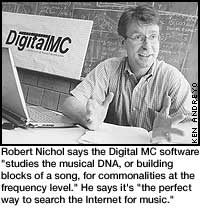|
|
||
|
|
|
University Team Develops Smart Software to Help You Find Music You Like "Digital MC" Wins $50,000 EnterPrize Business Competition
A team of physicists/entrepreneurs has created Digital MC, a "smart" software product that helps you identify what you like about music and then helps you find selections that match your tastes.
Digital MC, short for Digital Music Classification system, is the brainchild of astrophysicists Robert Nichol and Andy Ptak, physicists Paul Eugenio and Curtis Meyer, entrepreneur Annette Banks and students Roman Stanchak, Eric Leese, Jennifer Li and Brandon Weber, who are all majoring in computer-related fields.
Since its incorporation more than a year ago, Digital MC has received support from the Pittsburgh technological community. Nichol and Banks, Digital MC's co-founder and chief operating officer, put together a business plan this year that won the $50,000 top prize in the EnterPrize Business Plan Competition sponsored by the Pittsburgh Technology Council this spring.
Nichol says the software employs "cutting-edge mathematical algorithms to objectively classify and match digital music."
Digital MC doesn't store music or extract hundreds of lukewarm matches for the music listener to consider. The software dissects the music a person likes and recommends other music with the same qualities by using a mixture of machine-learning algorithms.
"In a sense, I guess you can say that our software studies the musical DNA, or building blocks of a song, for commonalities at the frequency level," Nichol said. "Through that analysis, it can determine a personal music universe."
The ultimate goal, Nichol said, is to have a major music distributor license or buy the software and incorporate it into its marketing efforts.
The scientific work on Digital MC and the science he does as an astrophysicist are unrelated, Nichol said. However, he said he and his Carnegie Mellon colleagues found that it wasn't inconceivable to go from using algorithms to analyze the spectrum of a black hole to creating customized, patent-pending software that reduces digital music files to a small number of coefficients that accurately describe the music.
These coefficients, once clustered, can be used to reference and compare other music, finding both similarities and differences. In this way, Digital MC is able to learn the specific music tastes of the listener.
"Obviously, we think it is the perfect way to push new music to listeners, automatically generate personal play-lists, and search the Internet for music," Nichol said.
"We keep hearing about how 90 percent of the songs downloaded using Napster are deleted within 24 hours. That said to me that people are looking for music and not finding it. So we wondered what would happen if we turned the question around and said to online music listeners, 'What do you like?' and then brought it back to them," Nichol said.
Digital MC also has received funding from Innovation Works, which promotes and funds early-stage high technology companies in southwestern Pennsylvania.
Teresa Sokol Thomas
|
|
This Issue's Headlines || Carnegie Mellon News Home || Carnegie Mellon News Service || Carnegie Mellon Home |
||
 Tired of hip-hop and rap? Looking for some music that would be pleasing to your ears? Welcome to the personal digital music universe.
Tired of hip-hop and rap? Looking for some music that would be pleasing to your ears? Welcome to the personal digital music universe.